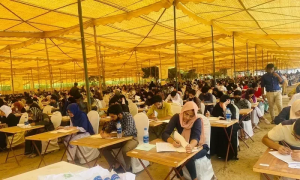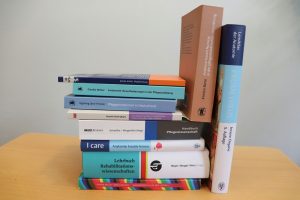Chasing the White Coat – The MDCAT Experience in Pakistan
The competitive world of MDCAT and its impact on aspiring medical students in Pakistan.
The Medical and Dental College Admission Test (MDCAT) is an annual exam in Pakistan that determines which students get into medical and dental schools. Every year, tens of thousands of aspiring doctors sit for this exam with the hope of securing a spot in one of the country’s limited medical institutions. However, the journey to and through this exam is no walk in the park. It’s a high-pressure experience that affects students not just academically but emotionally and socially as well.
The Numbers Speak Volumes
Each year, roughly 200,000 students from all over Pakistan register for the MDCAT, but only a small percentage succeed in gaining admission. With around 18,000 medical and dental seats available nationwide, the competition is fierce. The ratio of students vying for a single spot can be overwhelming. Students spend years preparing, studying for hours, and often sacrificing their personal lives for a chance to don the white coat.

The Race Begins Early
For many students in Pakistan, the race to get into medical school begins early. From secondary school onwards, students are encouraged to take up science subjects if they aspire to be doctors. The pressure often starts building as soon as they opt for the pre-medical track in higher secondary education (HSSC). Parents, teachers, and even the students themselves view the MDCAT as the ultimate goal, the culmination of years of hard work and dedication.
But this early focus on medicine often narrows their exposure to other fields. Most students are funneled into traditional career paths like medicine, engineering, or business, leaving little room to explore their true passions or interests. This lack of exposure to alternative fields can become problematic when, for various reasons, they don’t make it into medical school.
A Test Like No Other
MDCAT is no ordinary exam. It’s a challenging test that requires a deep understanding of subjects like Biology, Chemistry, Physics, and English. Students are expected to master vast syllabi in these areas, with the test emphasizing not just memorization but also critical thinking and problem-solving skills.
One of the more stressful elements of the MDCAT is that it only happens once a year. A bad day can mean an entire year of preparation goes down the drain. Many students also face the pressure of societal expectations, where failure is sometimes viewed as personal inadequacy rather than a momentary setback.

Stress and Pressure: A Double-Edged Sword
For students, the pressure surrounding MDCAT is immense. With the weight of expectations from family, friends, and even society, students often feel overwhelmed. The belief that a career in medicine is the “only” path to success is deeply ingrained in the educational culture, which can add to the emotional toll.
Moreover, mental health challenges, like anxiety and stress, are common among students preparing for MDCAT. With long study hours, sleepless nights, and the constant fear of failure, burnout is a frequent issue. Unfortunately, mental health support in schools and colleges is limited, leaving many students to manage these challenges on their own.
Coaching Centers: A Necessary Evil?
The competitive nature of MDCAT has given rise to a thriving industry of coaching centers across Pakistan. Many students, especially those from privileged backgrounds, enroll in these centers to gain an edge. These institutes promise specialized training, mock exams, and strategies to crack the test, making them a go-to option for most MDCAT aspirants.
However, this reliance on coaching centers raises several concerns. Students from lower-income families often cannot afford these expensive coaching classes, which puts them at a disadvantage. The question also arises: are these centers teaching students to understand concepts, or are they merely coaching them to “pass” the exam? This heavy focus on cracking the MDCAT often leaves students with a narrow understanding of the subjects.
Lack of Alternatives During School Years
One of the biggest criticisms of Pakistan’s education system is the lack of exposure to other fields during school and college years. From a young age, students are often pushed into specific streams—science or commerce—without being given the chance to explore options like humanities, arts, or vocational training. Many students pursue pre-medical studies simply because it’s what their parents want, or they feel it’s the only path to success.
This tunnel vision makes it difficult for students to consider alternative careers when they don’t make it into medical school. With limited career counseling available, students often feel stuck in a career path they don’t necessarily enjoy but feel obligated to follow. This problem is especially severe in rural areas, where students may not even be aware of other professions outside medicine and engineering.
The Emotional Toll of Failure
Failing the MDCAT can be a devastating experience for students. For many, it feels like the end of the world because of the overwhelming emphasis placed on success in this one exam. Society’s high regard for doctors and the lack of praise for other professions only exacerbates this feeling. Students who don’t make the cut are often seen as having failed not only themselves but also their families.

It’s essential to understand that failure in MDCAT doesn’t mean a student is not intelligent or capable. It simply means that medicine may not be their path. But without proper guidance or the chance to explore other fields, many students find it difficult to navigate this transition.
What About Alternative Fields?
While the medical field is undoubtedly prestigious, it’s crucial to highlight that it’s not the only career option. Unfortunately, schools and colleges in Pakistan do not place enough emphasis on exposing students to alternative fields such as biotechnology, psychology, business, or media studies. This lack of awareness leads to a situation where students feel that if they fail MDCAT, they’ve run out of options.
What we need is an education system that encourages students to explore their interests from an early age. Career counseling should be made an integral part of school curriculums, helping students understand that success can be achieved in many different ways. There is life beyond MDCAT, and it’s okay to pursue other passions.
The Importance of Parental Support
Parental expectations play a significant role in shaping a student’s career choices. In many households, becoming a doctor is seen as the ultimate goal, and anything less is often considered a disappointment. While parents want the best for their children, it’s essential to create a more supportive and understanding environment. Parents need to recognize the value of alternative career paths and support their children’s interests, even if those interests lie outside the traditional fields. By doing so, they can help reduce the pressure that students feel and give them the confidence to pursue paths they are genuinely passionate about.
Bridging the Gap with Career Counseling
There’s a critical need for proper career counseling in Pakistan’s educational institutions. Many students head into MDCAT unprepared for the possibility of failure and unaware of the alternatives available to them. Career counselors can play a pivotal role in helping students navigate these challenges, offering advice on other viable career paths, scholarships, and educational opportunities both in Pakistan and abroad. Schools and colleges must integrate career counseling into their programs to help students make informed decisions about their future.
The Role of Educators and Policymakers
Educators and policymakers also have a crucial role in transforming the way students approach exams like MDCAT. The focus should not solely be on pushing students toward medicine but rather on fostering an environment where every field is given equal importance. Schools should implement policies that encourage exploration of a broader range of subjects, promoting a holistic educational experience that values arts, social sciences, and technical skills just as much as medicine and engineering. By doing so, we can help nurture well-rounded individuals who are not defined by one career path but can thrive in various fields.
Creating a Future of Informed Choices
Ultimately, the key to reducing the overwhelming pressure surrounding MDCAT lies in changing how we perceive success. Success is not confined to the traditional paths of medicine or engineering, and students should be encouraged to find their passions early on, whether in scientific research, entrepreneurship, media, or any other field. By broadening the horizon of career opportunities, we can create a future where students are empowered to make informed, stress-free choices about their lives and careers—choices that align with their skills, interests, and aspirations, rather than societal expectations.
Finding Balance
The MDCAT is undeniably one of the most challenging and life-defining exams for students in Pakistan. But it’s important to remember that while the medical field is prestigious, it’s not the only path to success. With better mental health support, parental encouragement, and career counseling, students can feel more empowered to explore other options without feeling like their futures depend solely on the outcome of one test. For those who dream of becoming doctors, MDCAT is an essential hurdle. But for those who find their dreams elsewhere, life after MDCAT holds endless possibilities.

